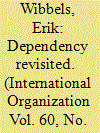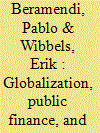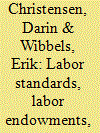|
|
|
Sort Order |
|
|
|
Items / Page
|
|
|
|
|
|
|
| Srl | Item |
| 1 |
ID:
072261


|
|
|
|
|
| Publication |
2006.
|
| Summary/Abstract |
While increased exposure to the global economy is associated with increased welfare effort in the Organization for Economic Cooperation and Development (OECD), the opposite holds in the developing world. These differences are typically explained with reference to domestic politics. Tradables, unions, and the like in the developing world are assumed to have less power or interests divergent to those in the OECD-interests that militate against social spending. I claim that such arguments can be complemented with a recognition that developed and developing nations have distinct patterns of integration into global markets. While income shocks associated with international markets are quite modest in the OECD, they are profound in developing nations. In the OECD, governments can respond to those shocks by borrowing on capital markets and spending countercyclically on social programs. No such opportunity exists for most governments in the developing world, most of which have limited access to capital markets in tough times, more significant incentives to balance budgets, and as a result cut social spending at the times it is most needed. Thus, while internationally inspired volatility and income shocks seem not to threaten the underpinnings of the welfare state in rich nations, it undercuts the capacity of governments in the developing world to smooth consumption (and particularly consumption by the poor) across the business cycle.
|
|
|
|
|
|
|
|
|
|
|
|
|
|
|
|
| 2 |
ID:
103306


|
|
|
|
|
| Publication |
2011.
|
| Summary/Abstract |
Developing countries vary dramatically in the amount they spend on social insurance. We establish a theoretical framework linking autarkic post-World War II economic development strategies with the emergence of insurance-based social policies. We argue that a government's choice of development strategy is conditioned by the size of the domestic market, relative abundance of labor, and land inequality in the context of a closed international trading system. The development strategy in turn shapes the fiscal priority governments place on social insurance. Contrary to the compensation hypothesis prominent in studies of the rich democracies, protectionist countries emphasize social insurance. Empirical analysis finds support for our argument. The results suggest that economic policies in the 1950s, 1960s, and 1970s had important implications for the emergence and current contours of social policy in the developing world. These differences in priorities swamp recent within-country changes.
|
|
|
|
|
|
|
|
|
|
|
|
|
|
|
|
| 3 |
ID:
077270


|
|
|
| 4 |
ID:
145718


|
|
|
| 5 |
ID:
133652


|
|
|
|
|
| Publication |
2014.
|
| Summary/Abstract |
Proponents often recommend high labor standards as a means of reducing inequality between and within countries. Opponents suggest that labor standards exacerbate international and domestic inequalities. In this paper, we forward a simple argument whereby the impact of higher labor standards on domestic inequality depends on a country's labor endowment. We hypothesize that where labor is abundant, higher standards will exacerbate inequality. Where labor is scarce, higher labor standards might lower inequality. In both cases, the impact of labor standards on inequality work through an employment and wage effect. Using newly available data on labor standards around the world from 1981 to 2000, we provide evidence largely consistent with our hypotheses. Higher labor standards do, indeed, exacerbate inequality in labor-abundant economies. On the other hand, higher labor standards lower inequality in labor-scarce economies. We discuss the implications of these findings for work on labor market insiders and outsiders as well as the political economy of development.
|
|
|
|
|
|
|
|
|
|
|
|
|
|
|
|
|
|
|
|
|